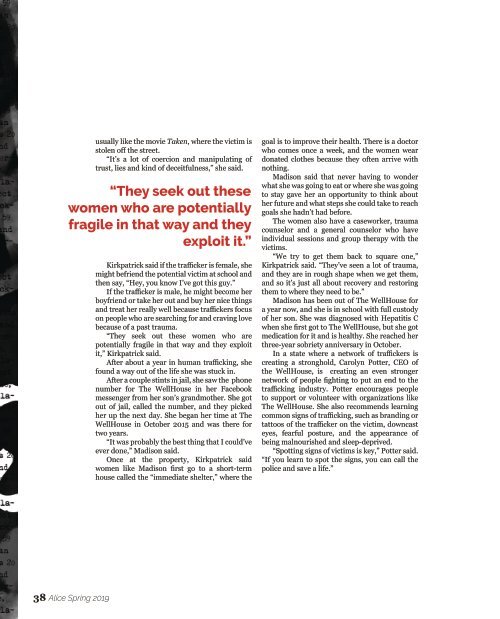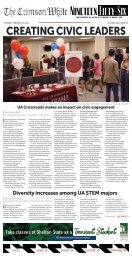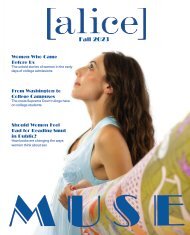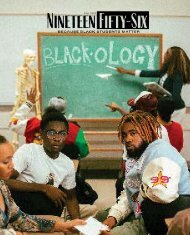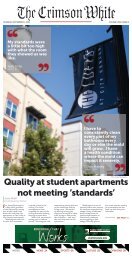Alice Vol. 4 No. 2
Published by UA Student Media Spring 2019.
Published by UA Student Media Spring 2019.
Create successful ePaper yourself
Turn your PDF publications into a flip-book with our unique Google optimized e-Paper software.
usually like the movie Taken, where the victim is<br />
stolen off the street.<br />
“It’s a lot of coercion and manipulating of<br />
trust, lies and kind of deceitfulness,” she said.<br />
“They seek out these<br />
women who are potentially<br />
fragile in that way and they<br />
exploit it.”<br />
Kirkpatrick said if the trafficker is female, she<br />
might befriend the potential victim at school and<br />
then say, “Hey, you know I’ve got this guy.”<br />
If the trafficker is male, he might become her<br />
boyfriend or take her out and buy her nice things<br />
and treat her really well because traffickers focus<br />
on people who are searching for and craving love<br />
because of a past trauma.<br />
“They seek out these women who are<br />
potentially fragile in that way and they exploit<br />
it,” Kirkpatrick said.<br />
After about a year in human trafficking, she<br />
found a way out of the life she was stuck in.<br />
After a couple stints in jail, she saw the phone<br />
number for The WellHouse in her Facebook<br />
messenger from her son’s grandmother. She got<br />
out of jail, called the number, and they picked<br />
her up the next day. She began her time at The<br />
WellHouse in October 2015 and was there for<br />
two years.<br />
“It was probably the best thing that I could’ve<br />
ever done,” Madison said.<br />
Once at the property, Kirkpatrick said<br />
women like Madison first go to a short-term<br />
house called the “immediate shelter,” where the<br />
goal is to improve their health. There is a doctor<br />
who comes once a week, and the women wear<br />
donated clothes because they often arrive with<br />
nothing.<br />
Madison said that never having to wonder<br />
what she was going to eat or where she was going<br />
to stay gave her an opportunity to think about<br />
her future and what steps she could take to reach<br />
goals she hadn’t had before.<br />
The women also have a caseworker, trauma<br />
counselor and a general counselor who have<br />
individual sessions and group therapy with the<br />
victims.<br />
“We try to get them back to square one,”<br />
Kirkpatrick said. “They’ve seen a lot of trauma,<br />
and they are in rough shape when we get them,<br />
and so it’s just all about recovery and restoring<br />
them to where they need to be.”<br />
Madison has been out of The WellHouse for<br />
a year now, and she is in school with full custody<br />
of her son. She was diagnosed with Hepatitis C<br />
when she first got to The WellHouse, but she got<br />
medication for it and is healthy. She reached her<br />
three-year sobriety anniversary in October.<br />
In a state where a network of traffickers is<br />
creating a stronghold, Carolyn Potter, CEO of<br />
the WellHouse, is creating an even stronger<br />
network of people fighting to put an end to the<br />
trafficking industry. Potter encourages people<br />
to support or volunteer with organizations like<br />
The WellHouse. She also recommends learning<br />
common signs of trafficking, such as branding or<br />
tattoos of the trafficker on the victim, downcast<br />
eyes, fearful posture, and the appearance of<br />
being malnourished and sleep-deprived.<br />
“Spotting signs of victims is key,” Potter said.<br />
“If you learn to spot the signs, you can call the<br />
police and save a life.”<br />
38 <strong>Alice</strong> Spring 2019


